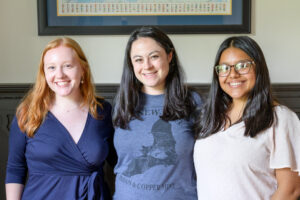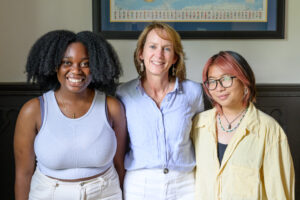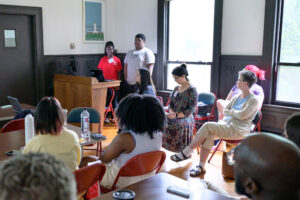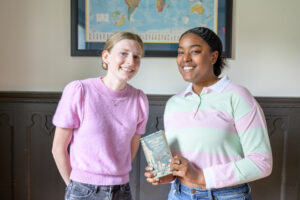Trinity College Public Humanities Collaborative Projects Summer 2023
The Public Humanities Collaborative (PHC) is pleased to share projects from 5 teams of students, faculty and community partners from Summer 2023. Over the last five years, we have seen how the PHC gives students the opportunity to engage with multiple methods and contexts in the humanities through full time summer research assistantships focused on both faculty scholarship and community public humanities projects. This summer, we were excited to continue to build on the program’s success and support meaningful work on both short and long-term faculty and community projects. Mary Mahoney, Trinity’s Digital Scholarship Strategist, joined the program as a co-director alongside Erica Crowley, Director of Community Learning and Hilary Wyss, PHC Faculty Liaison and Allan K. Smith and Gwendolyn Miles Smith Professor of English.
From over 35 applicants, PHC selected 10 students for the opportunity the summer where each student receives a $4600 stipend as well as on-campus housing. In addition to their work on faculty and community partner projects, students attended weekly lunch and learn workshops on research skill development, panel discussions on careers and further education in the humanities, reflection in community public humanities work, and career and portfolio development. Every lunch and learn workshop was open to guests of students, faculty and community partners. Throughout the summer, project teams had access to the team of PHC administrators for individualized and small group project support as well as the opportunity to attend field trips and public events in the Hartford area.
Read on for more information about each of the projects.
Illuminating Legal History with Old New-Gate Prison and the Prudence Crandall Museum
Ava Caudle ’25, Elizabeth Ochoa ’24, Professor Glenn Falk and community partners Morgan Bengel, Old New Gate Prison, and Joanie DiMartino, Prudence Crandall Museum

Community partners at Old New-Gate Prison asked Ava and Elizabeth to focus their research on the evolution of New-Gate as an institution, the historical context for its approach to punishment and lasting effects, and to uncover some of the individual experiences of those who were incarcerated. They expanded on the Old New-Gate website (which was designed by past PHC students) and refined the existing pages for public use. Partners at the Prudence Crandall Museum asked Ava and Elizabeth to focus on Crandall’s post-Canterbury time, her movements and involvements. They created a website for the museum produced a StoryMap, Timeline and other writing documenting Crandall’s post-Canterbury time.
Bushnell Park Community Displacement and The Primus Project Histories of Trinity College
Nicole Ankrah ’26 and Vy Sa Nguyen ’26
The Primus Project explores the ways that Trinity College as an institution, and the individuals associated with it, engaged with systems of slavery and white supremacy. It is a research-driven, community-based initiative to better understand the college’s past and forge a more just and inclusive present. As contributors to the project, Nicole and Vy Sa conducted research on the individuals, banks, committees and organizations connected to Trinity College and the Atlantic slave trade, which will be used to support the development of a network visualization using Tableau, thanks to the expertise of Senior Instructional Designer Cheryl Cape.

The Bushnell Park Conservancy asked Nicole and Vy Sa to update the written narrative of its history, including the written tour script, to include information about the communities displaced to make way for the creation of the park in the mid-1800s. In addition to this research, Nicole and Vy Sa worked with Mary Mahoney to begin developing a walking audio tour using Gesso, which includes present and historical images and illustrations of the park, ambient sound and descriptions provided by the community partner.
The UniverCities Project and Uncovering and Resisting Physical Class and Racial Barriers in Hartford
Xabian Alarcon ’26, Britny Owusu ’26, Davarian Baldwin, Paul E. Raether Distinguished Professor of American Studies and community partner Steve Thornton, founder of the Shoeleather History Project

With the recent publication of In the Shadow of the Ivory Tower, Baldwin was able to amass a significant amount of data on the history and present-day consequences of higher education’s impact on their host cities. While only a portion of this research was made public in the book, communities all over the country are eager to have access to this material for their own research and public engagement. Xabian and Britny worked with Professor Baldwin to develop a database using Airtable to organize, catalog and curate this data into various formats to prepare for public consumption.
For the community partner project, historian Steve Thornton asked for Britny and Xabian’s assistance in a research project exploring the physical barriers in Hartford that have restricted the movement between neighborhoods and blunt the progress of poor and working class people. Case studies included the destruction of the Front Street neighborhood to build Constitution Plaza, the Hartford Process memo, the Asylum Hill Project, and the Skywalk proposal.
The “Trinity Connection” to Nuestra History, History Culture and Art in Frog Hollow Walking Tour and a Brief History of the Cultural Houses at Trinity College
Momo Djebli ’25 and Naiya Roe ’25, Robert Cotto Jr., Director of DEI Campus & Community Engagement and community partner Logan Singerman, Southside Institutions Neighborhood Alliance (SINA)
A Brief History of the Cultural Houses at Trinity College explores the way the College and its students have created safe and intellectually rich spaces such as Umoja House, La Eracra and the Asian American Students Association (AASA) House. Momo and Naiya sourced articles and images from the Trinity Tripod and other archival materials to identify themes and threads in the history of the houses. To compile and present what they found, the team decided to develop a StoryMap which can be contributed to by future student researchers as the project expands in the future.
Naiya and Momo also worked with community partner Logan Singerman at SINA to contribute to a long-term project supporting the development, expansion and improvement of the Frog Hollow Walking Tour, Nuestra History: History, Culture and Art in Frog Hollow. This partnership began in the Fall of 2021, then named the Frog Hollow People’s Oral History Project, as part of a partnership between the Southside Institutions Neighborhood Alliance (SINA) and the Liberal Arts Action Lab. Over the years students in various community-engaged programs have contributed content to the tour in collaboration Frog Hollow community members. This summer, Naiya and Momo enhanced some of the stops on the tour, made new additions to the content, and created and tested an offline version so that people without internet access or cellular data could access the tour.
Anti-Tom Digital Exhibits: How Collections and Programs Tell Race History and Invite Positive Change with the Harriet Beecher Stowe Center
Sophia Jones’ 24 and Essence Smith ’24 with community partner Beth Burgess, Harriet Beecher Stowe Center

As part of the Stowe Center’s project titled “Viral Justice: How Collections and Programs Tell Race History and Invite Positive Change” community partner Beth Burgess asked Sophia and Essence to create two digital exhibits documenting anti-Tom literature. They conducted research focused on an 1852-1860 Anti-Tom Exhibit and a New Anti-Tom Exhibit, uploaded the works they found onto Connecticut Collections with scanned images, and then developed and user-tested their pilot exhibits with Stowe Center staff and other audience members.
The Public Humanities Collaborative (PHC) is a summer research opportunity that brings together students, faculty, and individuals and organizations in Hartford to work on public humanities projects. The 2022 PHC is a component of Trinity College’s Summer Research Program funded by the Dean of Faculty’s Office. PHC is a competitive application process, with preference given to first generation, under-represented, and other students with demonstrated financial need, for whom socio-economic status has prevented them from engaging with summer research opportunities.
